Dandelions may not be the worst weed existing due to their edible leaves, but they are absolutely annoying to control. If you are reading this post, you’re probably close to giving up your yard to dandelions and looking for a last resort by searching for the best dandelion killer.
In A Hurry, Our Top Picks:
- Best dandelion killer for lawns: Southern Ag Amine 2,4-D WEED KILLER
- Best organic herbicide (non-selective): Just For Pets Weed Killer Spray
- Best dandelion spot-treatment: Compare-N-Save Weed Killer
Using weed killers have its pros and cons. Before you use weed killers, we highly suggest that you consider trying homemade solutions and weed control practices to control them. Here is a separate post discussing the home remedies to control dandelions without chemicals.
A dandelion flower can produce 150 to 200 seeds that can fly across your garden with a subtle blow of wind. A single dandelion plant can produce ten flowers. If all of its flowers bloom, your garden will be full of thousands of dandelion seeds waiting to germinate as the sun comes down.
Sounds like a ticking time bomb, right?
Frustrating as it can be, don’t fret and succumb to your war against dandelions because you still have a fighting chance. Some strategies can help you win against the ever invasive dandelions.
(You could use the table of contents below to jump to the sections that are most important to you.)
Choose Your Weapon: Kill Dandelions vs. Kill All
There are three ways for you to eliminate the rapid spread of dandelions in your yard. You can either prevent the weed seeds from growing, kill the dandelions and other weeds, or kill all the plants in your yard and start again.
In horticultural space, these strategies correspond to the following classification of herbicides:
Selective and Non-Selective Herbicides
Selective herbicides selectively kill weeds and protect the grass in your yard. They usually include the chemical 2,4-D, which is toxic to broadleaf weeds.
Non-selective herbicide is the kill-all option where even grass can die. The herbicides under this category are potent and can risk killing other plants in your yard if you are not careful in using them.
Some organic materials like highly-concentrated vinegar have a non-selective effect on plants.
Glyphosate herbicides are notorious for being highly potent and can kill plants instantly. However, there are many health risks involved with glyphosate, like cancer, and many gardeners and farmers are now avoiding it.
Brands like RoundUp and Rodeo contain glyphosate. If you want something that works, you can count on these brands, but it comes with risks. We will leave the decision up to you if you wish to buy them or not. Here are some of them:
- Roundup RTU Weed & Grass Killer III
- Roundup Weed & Grass Killer Plus Weed Preventer II
- Killzall Weed and Grass Killer
Note: We only added one glyphosate-containing weed killer to our top 12 list due to the possible risk to human health.
Pre-emergent and Post-emergent Herbicides
Pre-emergent herbicides kill weeds before they even start growing. They alter the structures of the seeds that prevent them from germinating. These herbicides can’t kill already established and growing weeds.
Post-emergent herbicides kill growing and established weeds. They dry the weeds up and prevent the flowers from growing. Most weed killers in the market are post-emergent and packed in a ready-to-use formula.
The two classifications of herbicides can be mixed, revealing the four specific herbicide categories, which include:
- Pre-emergent and selective herbicides
- Pre-emergent and non-selective herbicides
- Post-emergent and selective herbicides
- Post-emergent and non-selective herbicides
12 Best Dandelion Killers For The Persistent Weeds in Your Garden in 2023
To easily identify the function of each herbicide, we grouped the best dandelion killers in the four-category combinations listed above. Check out the best dandelion killer for each category below:
Pre-emergent and Selective Herbicides
Herbicides under this category selectively prevent the weed seeds from germinating. They are safe for use on lawns and yards where you want to preserve other greeneries other than weeds.
1. Espoma Weed Preventer Plus Lawn Food
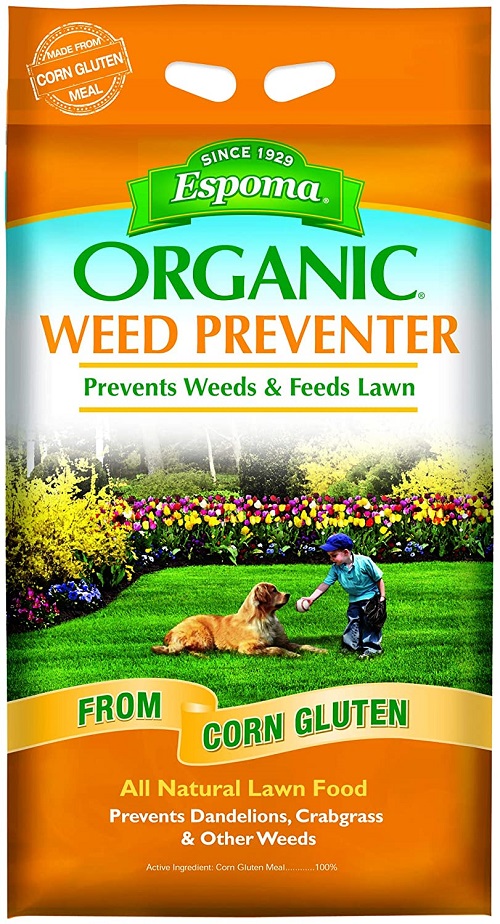
If you’re a pet parent and have kids around, you may want to use a dandelion killer that is safe and does cause health risks. Espoma Weed Preventer contains corn gluten which selectively prevents weed seeds from growing.
Since this pre-emergent herbicide does not contain chemicals, there is no risk of burning your grass. Your pets and children can also run around your yard immediately after lawn application. The success of using this weed killer lies in perfect timing. You must apply it on your lawn during:
- Spring: When the weeds are actively growing.
- Early Fall: When dandelions are preparing for dormancy.
Another crucial thing that you should remember is you should only use this weed preventer on established lawns. Refrain from using it on newly seeded lawns. It doesn’t kill established dandelions, so you need to pull them out.
After several applications of this pre-emergent herbicide, you will gradually see how the dandelions slowly stop popping up. It takes three consecutive applications before you can fully see significant results. So, if you’re looking for something instant and have no patience to wait, this is not the best option for you.
Espoma Weed Preventer is ideal for those who have kids and pets around. It also works for St. Augustine grass which is sensitive to most common weed killers. It’s organic and contains plant food, which is a win-win for your grass and the environment.
Pros
- Organic dandelion killer
- Easy to use
- Safe for use around kids and pets
- Environment-friendly
- Reduce weeds right before they even spread more seeds
- No chemicals
- No mixing and measuring
- Slow but efficient weed killing capacity
Cons
- Take several applications to see significant results
- Can’t kill established dandelions
2. Quali-Pro Prodiamine Pre-Emergent Herbicide
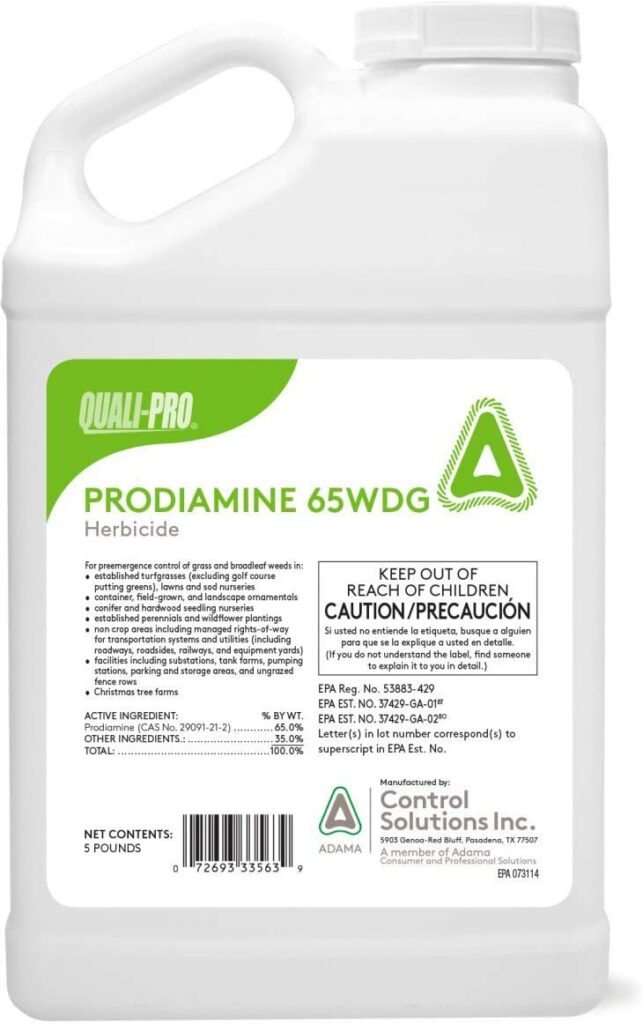
Quali-Pro Prodiamine Herbicide is a pre-emergent dandelion killer that helps keep weed seeds from sprouting and popping out during the growing season. It is a granular formula that you will mix with water and spread on target areas.
This herbicide is an ideal dandelion killer for lawns and golf courses. Aside from dandelions, it can help control:
- Annual bluegrass (Poa annua)
- Henbit
- Knotweed
- Chickweed
- Spurge
- Foxtail
- Goosegrass
The active ingredient of this herbicide is 65% prodiamine. It is a chemical that activates at 50°F soil temperature and prevents the roots from the weed seeds from developing. It doesn’t harm the grass, and most gardeners appreciate how it can turn a yard full of dandelions into a weed-free yard.
This weed killer is an agricultural-grade herbicide. So, not a lot of homeowners know about it. It is synthetic, so you should take precautions in using it. It can be a bit pricey, but gardeners love how it provides value for money because no weeds can be seen in their yards after several months.
Pros
- Control dandelions within months
- Doesn’t harm grass
- Provide value for money
- Ideal for tough weeds
- Easy to use
- Prevent the growth of notoriously tough weeds
Cons
- Synthetic herbicide
Pre-emergent and Non-selective Herbicides
Herbicides under this category prevent any kind of seeds from germinating. Even grass seeds will not germinate since they contain non-selective components.
RM43 43% Glyphosate Plus Weed Preventer
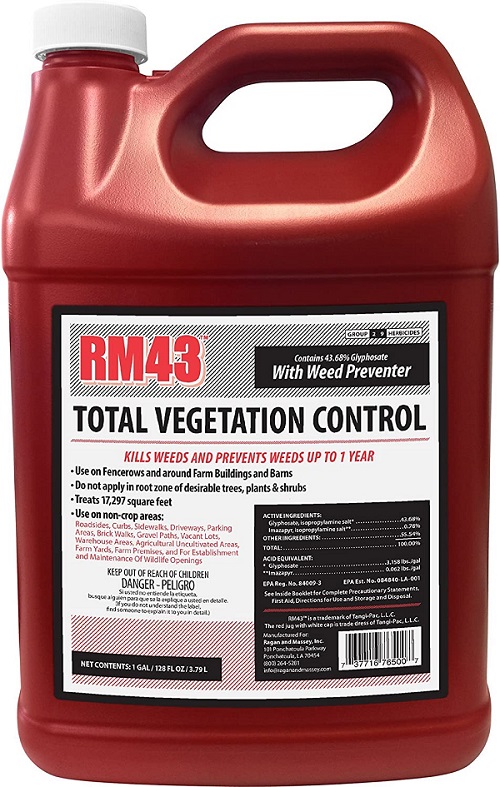
RM43 is a combination of pre-emergent and post-emergent formulas. It contains glyphosate that kills the established weeds, plants, grass, and any kind of vegetation.
On the other hand, it also contains Imazapyr, which serves as the weed preventer or pre-emergent herbicide, keeping your area vegetation-free for up to one year.
This herbicide is not for the impatient gardener. It takes a while to work than RoundUp, but the effect lasts longer. It is also more suitable for treating large areas where no plants are desired, such as:
- Fence rows
- Gravel paths
- Sidewalks
- Driveways
- Parking areas
- Around farm buildings
- Barns
The solution is highly concentrated and can cover up to 4,324 sq. ft of space. It can be used for spraying a huge area and spot treatments using different dilution directions. If used for spot treatments, the whole bottle can produce five gallons of solution.
Most gardeners usually compare it to RoundUp when it comes to their fast-acting performance. However, they differ in glyphosate percentage. RoundUp has a higher glyphosate content that kills plants within days.
RM43, on the other hand, takes about a month to show results but its effect lasts longer. For stubborn weeds like dandelions, two applications might be required. It can be a bit pricey, but with little to no re-application needs after treatment, you’re actually saving more.
Pros
- Work as a post-emergent and pre-emergent non-selective herbicide
- Season-long effect
- Highly-concentrated
- Easy to use
- Ideal for treating large areas
- Can be used for spot treatments
Cons
- Contain glyphosate
- Re-application of the solution may be required for stubborn weeds.
- Not ideal for impatient gardeners
- No instant effect and only shows results after a month
Post-emergent and Selective Herbicides
Herbicides under this category selectively kill mature or established dandelions and other weeds. They are safe for use on grass.
1. Gordon’s Amine 400 2,4-D Weed Killer
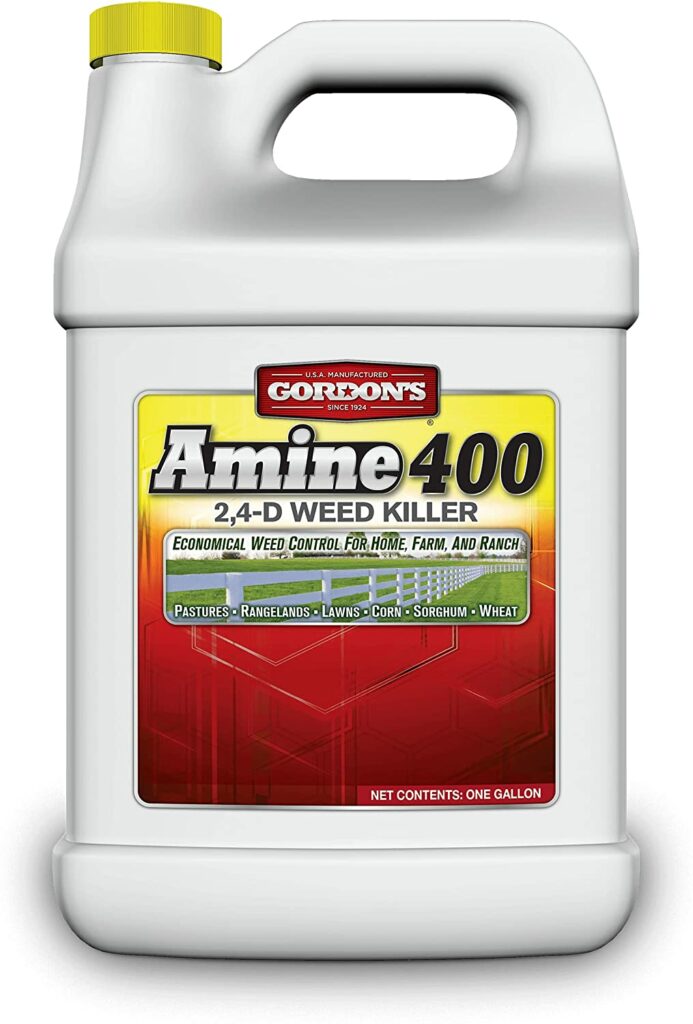
Gordon’s Amine 400 Weed Killer is an agricultural-grade post-emergent herbicide that will slowly remove the dandelions in your yard. It has a water-based formula that allows easy absorption and improves its efficiency. Aside from dandelions, it is also applicable on: Beggarticks, Burdock, Kochia, Horsetail, Ground Ivy, Ironweed, Radish (wild), etc.
This herbicide is cheaper than most mainstream brands but works just the same. Every two ounces of its concentrated formula can provide a gallon of herbicide solution for lawns. Gardeners add a surfactant or dish soap to the diluted solution to help it stick on the leaves of the weeds and improve its efficiency.
Most gardeners and homeowners notice that it can kill the dandelions within 12 hours, but some take a week or two. It is safe for use on grass, but too much application can cause chemical buildup and burn the grass. If you want something safer than RoundUp or any glyphosate herbicide, this brand is worth the try.
During the first week of weed treatment, you can expect some discoloration and yellowing of leaves. After two weeks, there will be no single sight of dandelions in your yard. Since it is water-based, it has a rainfast of 8 hours.
To learn more about this product, you may check more about it here.
Pros
- Kill dandelions within weeks
- Ideal alternative to glyphosate-containing herbicides
- Affordable
- Safe to use on grass
- Easy to use
- Highly-concentrated
Cons
- Not ideal for impatient gardeners because it takes two weeks to see significant results
2. Compare-N-Save 2-4-D Amine Broadleaf Weed Killer
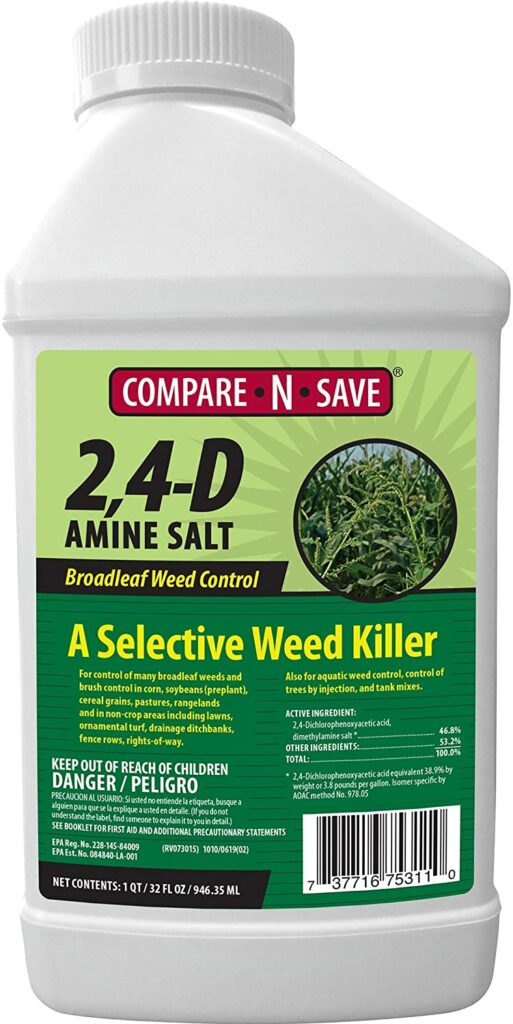
Compare-N-Save Weed Killer is another affordable dandelion killer with a water-based formula. A bottle can cover up to 43,280 sq. ft. of lawn. The manufacturer claims it can kill over 150 kinds of weeds, including dandelions. Unlike other herbicides, it can be used in crop areas for:
- Corn
- Soybeans
- Small grains
- Pastures
- Rangelands
Non-crop areas:
- Lawns.
- Golf courses
- Ornamental turf (residential, industrial, and institutional)
- Sod farms
- Drainage ditch banks
- Airfields
- Fence rows
- Roadsides
- Rights-of-way
- Vacant lots
- Parks
- Industrial sites
- Cemeteries
- Utility power lines
- Athletic fields
- Railroads
For successful weed control, you must apply it when the dandelions are actively growing. You may use it as a spot treatment, but not as a spray for the grass varieties listed below:
- Creeping grass such as bentgrass
- St. Augustine
- Centipedegrass
- Newly seeded turf
The manufacturer recommends a limit of two applications per year using this herbicide. If you’re dealing with mature and persistent dandelion, you may increase the dilution rate. Most gardeners find it effective as a spot treatment for the stubborn dandelions in their yards.
This herbicide is affordable but may take five days to two weeks to see significant results in the treated area. If the recommended dilution is no longer working, you may try the suggestion of some professional gardeners by diluting three tablespoons of this herbicide to a gallon of water.
Pros
- Affordable dandelion killer
- Easy to use
- Ideal option for spot-treating dandelions
- Control several kinds of weeds
- Can kill mature and established dandelions
Cons
- Not applicable for bentgrass, St. Augustine, and centipedegrass
3. Southern Ag Crossbow Specialty Herbicide
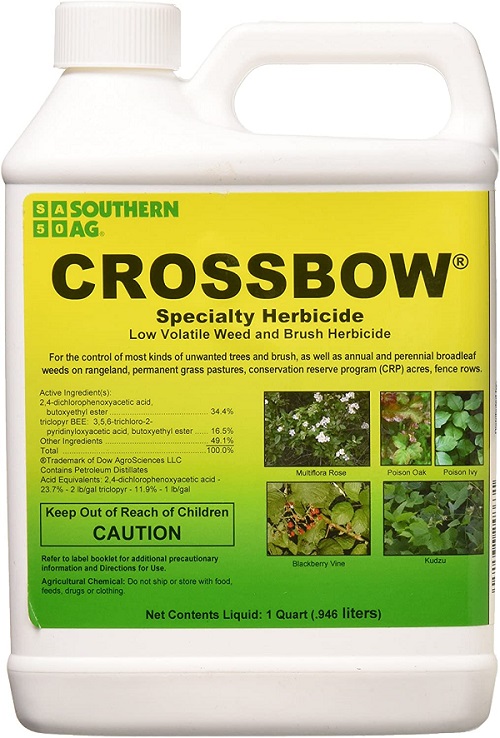
Southern Ag Crossbow Herbicide is an agricultural-grade 2,4-D concentrate that controls weeds and unwanted bushes. It selectively kills dandelions, clover, thistles, and other persistent weeds. It is best used for:
- LawnRangeland
- Grass pastures
- Non-crop areas.
Aside from 2,4-D, it contains butoxy ethyl ester and triclopyr which usually work best on weeds when applied during spring or fall. Most gardeners use it for both spot-treating and spraying it over lawns infested with dandelions.
The solution of this herbicide is highly concentrated, so a little goes a long way. It is an ideal option to kill stubborn dandelions with established and thick taproots. In some cases, one application is enough to wither the dandelions, but some tough ones require two consecutive applications.
Gardeners love how Crossbow is efficient in killing dandelions. However, if you are looking for instant results, this is not the option for you because it takes a week or two for this herbicide to work.
Pros
- Kill tough established dandelions
- Protect the grass
- Highly-concentrated
- One or two applications are enough to kill the weeds
- Agricultural-grade selective herbicide
Cons
- Not ideal for use near vegetable gardens
- Highly volatile contents and should be used with caution
- Take two weeks to show results sometimes
4. Southern Ag Amine 2,4-D WEED KILLER
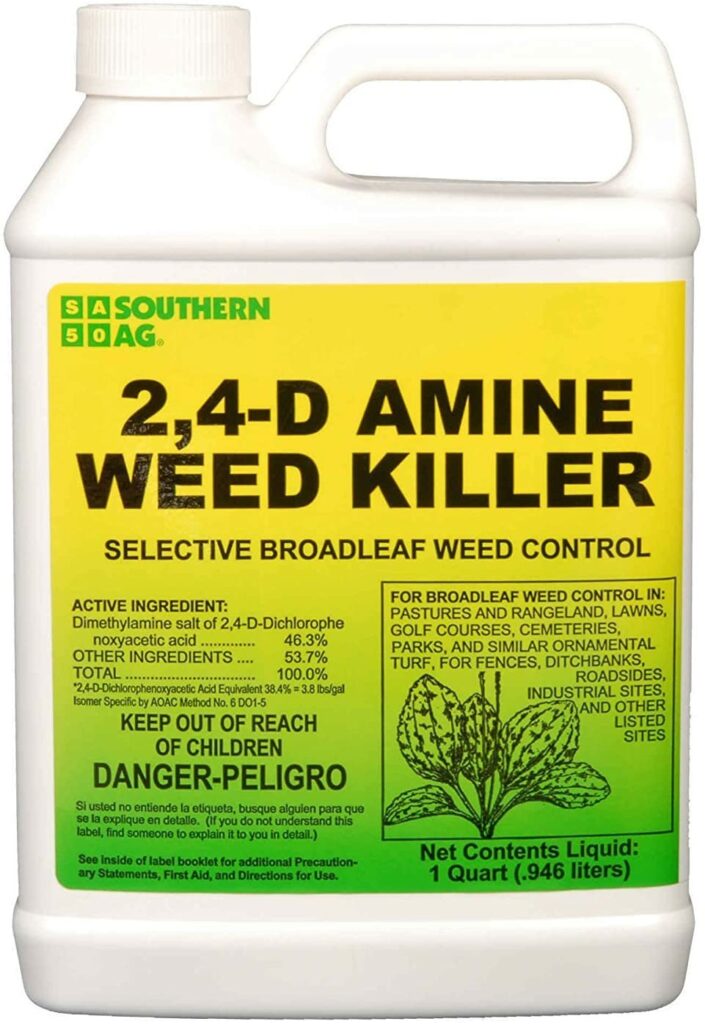
Southern Ag Amine 2,4-D Weed is probably among the best dandelion killer in the market due to its ability to help homeowners and gardeners win their war against stubborn dandelions. It contains a formula that has lower volatility than pre-emergent herbicides. You can use it on:
- Lawns
- Parks
- Golf courses
- Pastures
- Fences
- Ditch banks
- Non-crop sites
The formula of this herbicide is highly-concentrated, and 2 to 3 tablespoons can produce 3 to 5 gallons of solution that can cover 1,000 sq. ft. of space. It is one of the few brands that has received a lot of praise from gardeners due to t its efficiency in killing dandelions and proper setting of expectations of its consumers.
It applies to most types of grasses but may injure the following grass varieties:
- Bentgrass
- St. Augustinegrass
- Carpetgrass
- Centipedegrass
- Dichondra
- Clovers
The herbicide effect takes two weeks to eliminate every single dandelion in your yard. If you’re expecting an instant result, this may not work for you.
Pros
- Among the best dandelion killers
- Kill dandelions within two weeks
- Ideal for spot treatment and general spray
- Easy to use
- Efficient weed-killing capacity
Cons
- Not ideal for impatient gardeners
- Not applicable on some types of grasses
5. Ortho WeedClear Weed Killer for Lawns
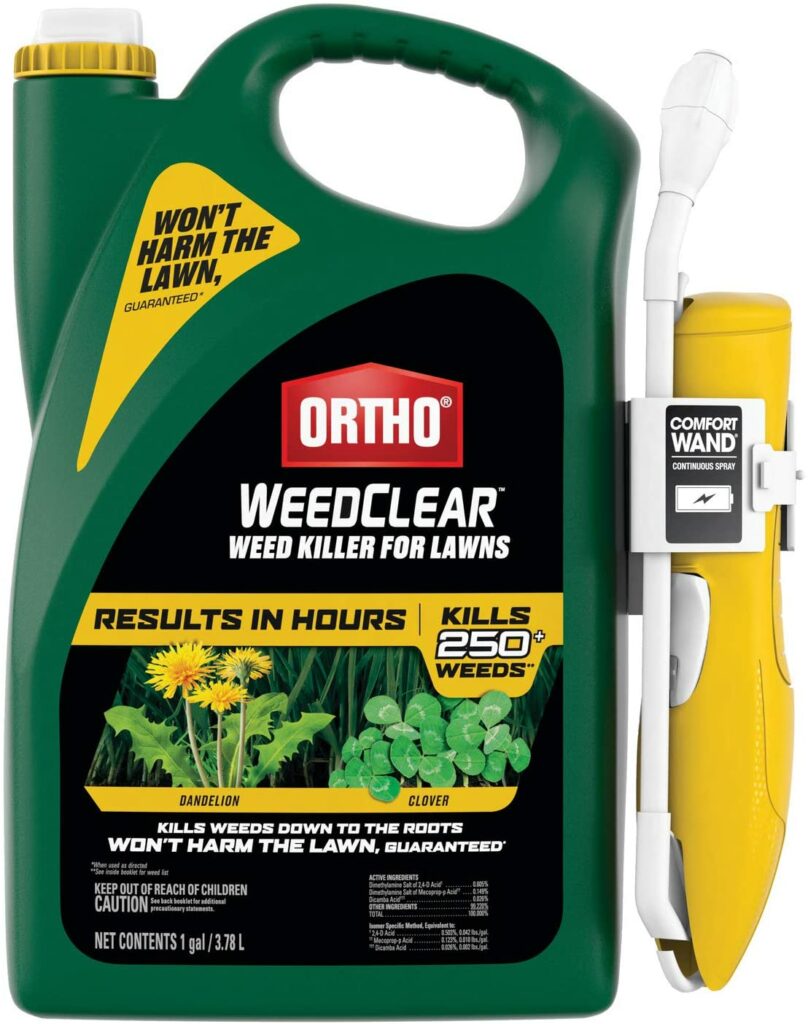
Homeowners new to lawn care would usually go for the ones they can find in big-box retailers, like Ortho WeedClear. It is specially formulated for residential use and suitable for common types of lawn grasses with sprayer packaging that can ease up hand fatigue.
You may use it on dandelions growing from any of the following grass varieties:
- Kentucky bluegrass
- Tall fescue and fine fescues
- Bermudagrass
- Zoysiagrass
- Buffalograss
- Ryegrass
Many gardeners often see the resemblance of this herbicide to Weed B Gon, which is also a product of Ortho. The manufacturer claims that it can kill dandelions within hours after application due to the combination of the following ingredients:
- 2,4-D, dimethylamine salt: 0.313%
- Quinclorac: 0.104%
- Dicamba, dimethylamine salt: 0.029%
One that may catch your attention is its no-pump and ready-to-use spray wand packaging. It is convenient in the sense that you no longer need to mix the solution and downright use it as soon as it lands on your home. However, since it contains 2, 4-D, some grass varieties may die because of it, including:
- Bahiagrass
- Carpetgrass
- Bentgrass
- Centipedegrass
- Dichondra
- St. Augustinegrass
The best point of this herbicide is it works on dandelions, but with heavier application and a little bit of patience to wait for the results. Most gardeners notice that it works well on dandelions but not on other pesky weeds listed on its label.
The only catch when buying this herbicide is its conflicting information about the grass varieties it can treat. The marketing materials have some discrepancies with what is on the label. These discrepancies may target the untrained eye of some gardeners and mistakenly kill their grass along the way.
To know more about the real deal on this herbicide, check out its label here.
Pros
- No mixing, pumping or prepping
- Has the best packaging that promotes convenient spraying on lawns
- Easy to use
- Kill dandelion within hours (tough and mature dandelions take weeks)
- Applicable to six common residential types of grass
Cons
- Conflicting information between its online information vs. its label (Check its label first before you use it on your grass)
6. GreenView Weed & Feed
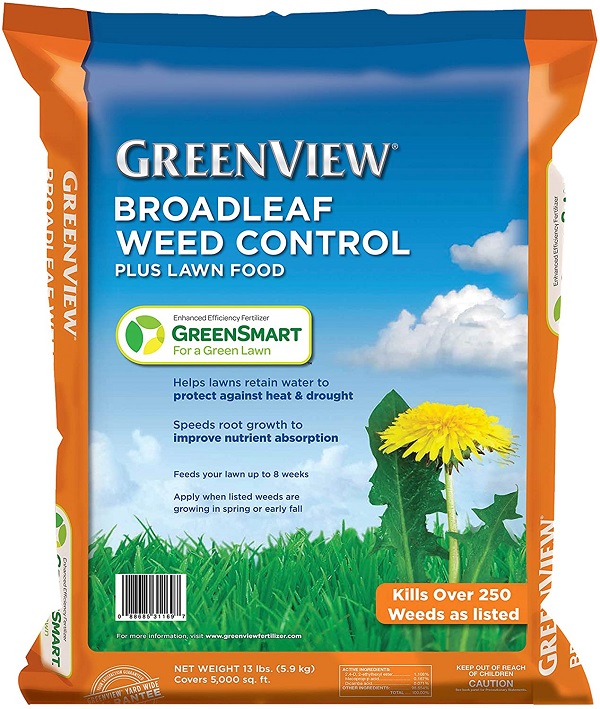
If you want to save on lawn fertilizers, buying a multipurpose dandelion killer like Greenview Weed & Feed can be a practical option. It has a granular formula that claims to kill 250 types of weeds and feed your grass for up to eight weeks.
The fertilizer part of this herbicide has an NPK ratio of 27-0-4. It has no phosphate under the brand’s aim to prevent leaching in the soil and protect waterways.
The fertilizer aids in rapid green-up of the lawn as soon as its competitors (weeds) die because of its weed killer effect. The plant food part improves the soil microbiome and increases grass resistance against drought and heat. It also contains MESA nitrogen technology which slowly releases the nutrients in the soil.
This weed and feed brand does not apply to the following grass varieties:

Gardeners and homeowners often see a significant reduction in dandelions a week after herbicide application. It is also affordable, the best alternative to pricey weed killers, and ideal for treating small yards.
Pros
- Kill weeds while feeding your grass
- MESA nitrogen technology (gradual and lasting release of nutrients)
- Easy to use
- Kill dandelions within a week
- Affordable
- Ideal for treating small yards
- No phosphate – Good for waterways
- Improve drought and heat tolerance of grass
Cons
- Not ideal for an impatient gardener
- Tough and mature dandelions need a dual application
7. Spectracide 96262 Weed & Feed
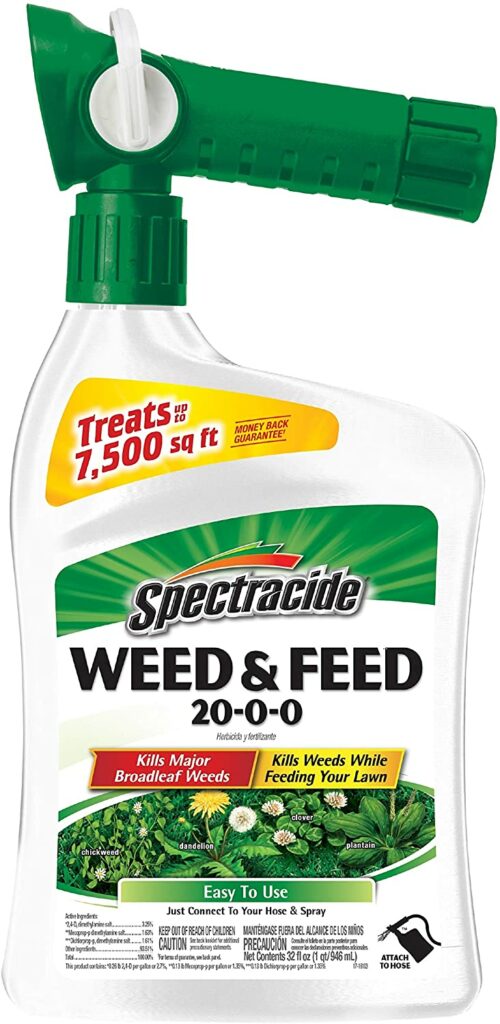
Spectracide Weed & Feed is another weed and feed option if nothing works on the dandelions in your yard. Its fertilizer part has an NPK ratio of 20-0-0. It is in a ready-to-use formula and comes in a hose-end sprayer packaging.
Aside from dandelions, it can kill the following weeds:
One bottle of this herbicide can treat about 7,500 sq. ft of lawn. It is another weed killer that needs a lot of patience because the dandelions take a week to die. Though it does not harm most types of grass, it may cause serious injury and discoloration on St. Augustinegrass and centipedegrass. It is also not recommended for use on:
- Carpetgrass
- Dichondra
- Bentgrass
- Desirable clovers
- Floratam (St. Augustinegrass)
Though it takes time to kill dandelions, gardeners love this brand because it is affordable and does the job of controlling weeds. It also has the most durable hose-end applicator in the market that makes lawn treatments swift and easy.
Pros
- Affordable
- Easy to use
- A durable hose-end sprayer contributes to easy lawn application
- Kills weeds and feeds grass
- Control dandelions within one week
- No mixing and measuring required
Cons
- Not suitable for some types of grass
Post-emergent And Non-selective Herbicides
Herbicides under this category kill any mature and established vegetation site. They are ideal for driveways or yards prepared for planting new crops.
1. Just For Pets Weed Killer Spray
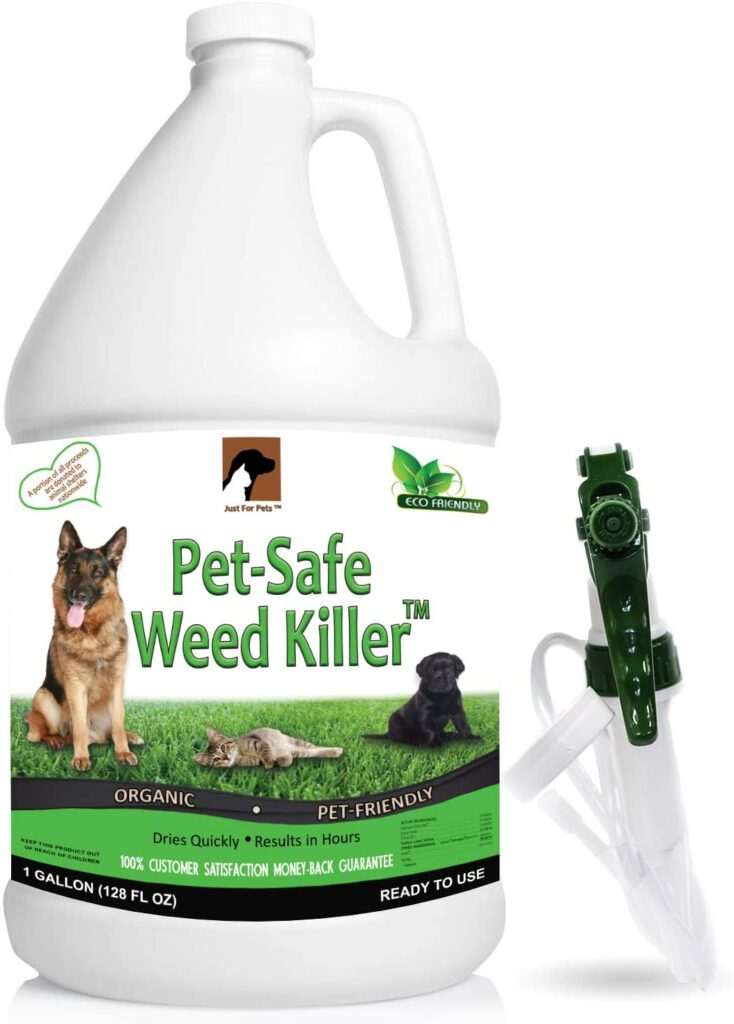
If you want to start from scratch in taking care of your lawn, why not opt for a pet and kid-friendly option. Just For Pets Weed Killer Spray is one of the few weed killers proven safe for use around kids and pets. It does not contain chemicals and has been derived from:
- Acetic acid (vinegar)
- Citric acid
- Sodium chloride
- Glycerin
- Clove oil
- Lemon Juice
- Water
This herbicide is ideal for health-conscious gardeners who aim not to use any glyphosate on their gardens. It is safe for pets to run around the treated yard, making this herbicide ideal for families with curious kids and pets around. What’s more, a portion of their earnings is sent to animal shelters across the country.
The formula of this herbicide is ready to use, and the packaging comes with a sprayer. The weeds and any vegetation often die within 24 hours to several days. It also has a strong vinegar smell that may stay for a couple of days in your yard.
So far, gardeners and pet-parents are satisfied with its weed-killing effect but not so much on its coverage. If your priority is safety for your kids, pets, and the environment, this is one of the best dandelion killers to consider.
The only concern you might encounter is its leaky and hard-to-use sprayer, especially if your hand has arthritis. Other than that, this organic herbicide is worth the try.
Pros
- Organic non-selective and post-emergent herbicide
- Safe for pets, kids, and the environment
- Kill any vegetation within 24 hours
- Ready to use
- No mixing or diluting required
- Ideal for establishing new gardens and lawns
Cons
- Faulty packaging that is not ideal for gardeners with hand injuries
- Kill any plant, even grass
2. Bonide 7468 Burnout Weed Killer
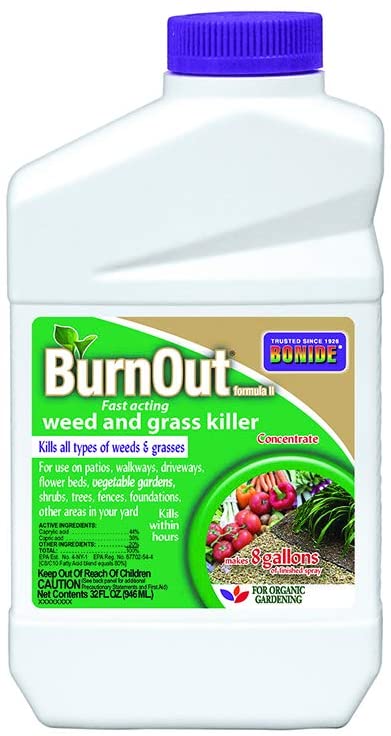
Bonide Burnout Weed Killer is another organic option that you can use to kill any vegetation in your yard. It contains 44% of caprylic acid and 36% capric acid derived from the fatty acids found in palm oil and coconut oil. It has a fast-acting control on:
- Weeds
- Grass
- Mosses
- Algae
This herbicide is ideal for use in areas there is no desired vegetation. It can kill plants within hours without having chemicals in it. It works best on plants in conjunction with the warm weather. It is one of the undiscovered organic options in treating lawns.
The formula of this herbicide should be mixed with water and sprayed on the lawn using a hand-held sprayer. A bottle can treat up to 3200 sq. ft. of space. Gardeners who discovered this gem love its organic formula since it doesn’t pose health risks to their kids and pets.
The only catch is it can be more expensive than others, and it has a strong clove aroma that may last in your garden for a couple of days. You may learn more about it by checking its label here.
Pros
- Organic non-selective herbicide
- Derived from fatty acids of coconut products
- Easy to use
- Safe for use around kids and pets
- No chemicals and glyphosate
- Kill any vegetation within hours
Cons
- Pricey
- Strong clove smell
Best Practices To Prevent Dandelion Invasion in Your Garden
Here are some of the best practices of gardeners in preventing the spread of dandelions and maintaining a weed-free yard:
(1) Cut off the dandelion flowers at first sight. Removing them immediately will prevent the air from spreading its seeds.
(2) When removing dandelions by hand, ensure that the taproot is included. Otherwise, they’ll continue to grow underground. You may use the following weedling tools to avoid the laborious task of pulling out dandelions:
(3) You can use a combination of post-emergent/non-selective herbicides to kill present and actively growing dandelions in your yard. Once done, use a selective pre-emergent herbicide to prevent the weed seeds from growing.
(4) Some gardeners consider a more sustainable route by collecting the dandelions as food. They’re a good substitute for your usual greens. Every part of the dandelion plant is edible because it is an herb.
It tastes like arugula but spicier. Also, it contains several nutrients that are denser than spinach, including:
- Vitamins A, C, and K
- Folate
- Calcium
- Potassium
Collect the dandelions in your yard as greens, and you’ll surely deplete their growth in your yard. You also get the nutritional benefits and savings from buying other leafy greens in the market.
(5) Dandelions are quite tenacious in a sense. When you mow them, they adjust and grow shorter stems so your mower can’t cut their stems next time. What a naughty and annoying weed!
(6) Remove dandelions after rain showers or when the soil is moist so you can easily remove thick taproots.
(7) Timing is crucial for the herbicide to work best in killing dandelions. Most of them only work when the weeds are actively growing. So, spray your preferred post-emergent weed killer during spring. Treating the dandelions during the hottest season of the year will not work unless you opt for a more potent non-selective herbicide.
(8) Read the label before using any weed killer on your lawn. Some grasses are sensitive to selective post-emergent herbicides such as bentgrass and dichondra.
Note: Refrain from eating dandelions that are treated with chemical herbicides. Ingestion of herbicide-treated weeds can lead to food poisoning and even death. Some people are also allergic to the pollens produced by the dandelion flowers and their sap that may cause contact dermatitis.
Fun Facts About Dandelions You Might Not Know
In case you’re looking for a more sustainable way to look at dandelions. Here are some interesting facts about them:
(1) Dandelions are initially used by the ancient civilization as medicine for blood cleansing and treating digestive problems.
- Fever
- Toothache
- Constipation
- Anemia
- Arthritis
- Diabetes
- Gall bladder issues
- Heartburn
- Skin issues
- Liver, stomach, and kidney disorders
(2) The dandelion flower can be used as a pale-yellow dye and the leaves as a purplish dye.
(3) The roots of the dandelion plant can be used as a healthier substitute for coffee.
(4) If you are wondering why dandelion keeps popping up in your yard, check your neighbor’s yard. Dandelion seeds have a parachute-like stem that allows them to travel up to 5 miles (or 8 km) from the flower.
So, don’t be surprised if treating your lawns once won’t be enough to eradicate them in your garden permanently if you’re surrounded by yards with tons of dandelions.
(5) Annoying as they are, dandelions have a beneficial effect on the ecosystem of your yard. They attract pollinators like bees and butterflies in your garden, which can help pollinate your vegetable plants and fruit trees.
Frequently Asked Questions (FAQs)
What will kill dandelions but not grass?
Selective herbicides can kill dandelions while protecting your grass. Weeds are sensitive to chemicals like 2,4-D that can dry and kill them within the day or up to two weeks.
How do I permanently get rid of dandelions?
You can permanently get rid of dandelions by removing their taproots by hand and applying selective pre-emergent herbicides that will prevent the weed seeds from germinating. Check for any sprouting dandelions and remove them ahead of time.
In some cases, the scuff and spray method works. If you’re willing to take risks, you may also use RoundUp, which contains glyphosate to get rid of weeds. However, it will also get rid of your grass.
What kills dandelions fast?
The removal of the taproot and using a kill-all (non-selective) herbicide are the fastest ways to kill dandelions. Selective and post-emergent weed killers take some time to dry and kill the weeds. The chemical and active ingredients must get into the plant’s system to do their job, which can last for three days to two weeks.
Can you kill dandelions with vinegar?
Yes, but not the kind of vinegar you use in the kitchen. You need a horticultural vinegar with a stronger acetic acid ranging around 45%. The household vinegar only contains 5% acetic acid that is safe for human consumption.
Final Thoughts
Dandelions may be a nuisance due to their invasive spread in the garden, but they play an essential role in the ecosystem. We encourage everyone to consider sustainable ways to control them and avoid destructive methods that can destroy the environment.
From our top list, here are the top 3 best dandelion killers that provide a high-quality product, value for money, and impressive benefit to gardens and lawns.
- Best dandelion killer for lawns: Southern Ag Amine 2,4-D WEED KILLER
- Best organic herbicide (non-selective): Just For Pets Weed Killer Spray
- Best dandelion spot-treatment: Compare-N-Save Weed Killer
We hope this post helped you solve your yearly problems with dandelions. May this year be a weed-free year for your lawns or garden. Let us know in the comments which method works best for you and how you were able to conquer the war against the dandelions in your yard.
Also, please don’t forget to share this post with those in a ranging war against weeds. Give them your secret weapons by sharing the best dandelion killers that you’ve tried from our post.
We wish you all the best and hope that you’ll win over your yard against pests and weeds this year.
